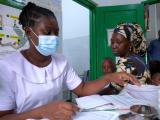Oct 4, 2011 (CIDRAP News) – Thirteen percent of parents follow a vaccination schedule other than the recommended one for their young children, and more than 20% of parents who follow the approved schedule have doubts about it, according to a survey report from University of Michigan researchers.
The authors say their findings, published online yesterday in Pediatrics, reflect parents' growing misgivings about the childhood vaccines recommended by the Centers for Disease Control and Prevention (CDC).
"The results of this study highlight the need to develop interventions quickly to quell the apparently growing concerns among parents about the safety and necessity of recommended childhood vaccines," says the report by Amanda F. Dempsey, MD, PhD, MPH, and colleagues in the Department of Pediatrics and Communicable Diseases at Michigan.
The authors comment that the use of alternative vaccination schedules leads to an increase in the risk of contracting vaccine-preventable diseases. For example, a 2000 study showed that children whose parents had skipped one or more recommended vaccinations were 22 times more likely to contract measles and six times more likely to get pertussis, compared with fully vaccinated children.
The survey was conducted online in May 2010 and targeted parents of children 6 months to 6 years old. The authors used KnowledgePanel, described as a probability-based sample designed to be representative of the US population.
The survey drew 2,064 respondents (a 61% response rate), including 748 parents with children in the targeted age range. The majority of the participants were white (63%), women (57%), and between the ages of 30 and 44 (55%).
Of the 13% of parents who said they followed an alternative vaccination schedule, 53% said they refused only certain vaccines, and 55% chose to delay some vaccines. Twenty-two percent of the group said they requested separate measles, mumps, and rubella vaccines, rather than the combined vaccine. Only 17% of the group—representing 2% of all respondents—said they refused all vaccines for their children.
The vaccine that was refused by the largest share of "alternative vaccinators"—86%—was the 2009 HN1 influenza vaccine. Refusal rates for some other vaccines were seasonal flu, 76%; varicella, 46%; rotavirus, 44%; pneumococcal conjugate, 31%; hepatitis B, 28%; measles-mumps-rubella, 26%; and hepatitis A, 24%.
Only 8% of the alternative vaccinators reported using a well-known alternative schedule, such as those recommended by Dr. William Sears and Dr. Donald Miller, the report says. The parents reported varying levels of physician support for using a nonstandard schedule, with 40% saying their doctors seemed supportive and 22% saying their child's doctor had actually suggested an alternative schedule. The survey didn't collect information about physicians' reasons for suggesting a different schedule.
In bivariate and multivariate analyses, the researchers found that the only factors associated with higher odds of using alternative vaccination schedules were not having a regular healthcare provider and being of nonblack race. The behavior was not linked to the child's age, gender, or insurance or to parental age, gender, insurance, or marital status.
The survey showed that a heavy majority of the alternative vaccinators harbored antivaccine attitudes—80% to 95%, depending on the attitude statement. About 60% of them said they had always followed a nonstandard schedule, but 30% said they had initially followed the recommended schedule and later changed, in most cases because of safety worries.
The study also indicated that a good many parents who followed the recommended schedule did so with some reluctance. Twenty-two percent of this group disagreed or strongly disagreed that the approved scheduled is best, and 18% agreed with the statement that delaying doses is safer for children. The authors voice concern that these parents are at risk for switching to alternative schedules.
The researchers write that because they used a broad definition of alternative schedules, some parents who skipped or delayed a vaccine because of vaccine shortages, illness, or missed appointments might have been wrongly classified as alternative vaccinators. But the findings are generally in line with previous studies, they add.
Dempsey AF, Schaffer S, Singer D, et al. Alternative vaccination schedule preferences among parents of young children. Pediatrics 2011 Nov;128(5) (early online publication Oct 3) [Abstract]


















